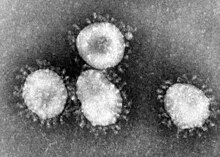Alphacoronavirus
| Alphacoronavirus | |
|---|---|
 |
|
| Virus classification | |
| Group: | Group IV ((+)ssRNA) |
| Order: | Nidovirales |
| Family: | Coronaviridae |
| Subfamily: | Coronavirinae |
| Genus: | Alphacoronavirus |
| Type species | |
|
Alphacoronavirus 1 |
|
Alphacoronaviruses are the first of the four genera, alpha-, beta-, gamma-, and delta-coronavirus in the subfamily Coronavirinae of the family Coronaviridae. Coronaviruses are enveloped, positive-sense, single-stranded RNA viruses that include both human and zoonotic species. Within this subfamily, viruses have spherical virions with club-shaped surface projections and a core shell. The name is from the Latin corona, meaning crown, which describes the appearance of the projections seen under electron microscopy that resemble a solar corona. This genus contains what were previously considered phylogroup 1 coronaviruses.
Both the alpha- and beta-coronavirus lineages descend from the bat gene pool.
The virion is enveloped and spherical measuring 120–160 nm in diameter and a core shell of about 65 nm. Glycoproteins and trimers form large surface projections which create the appearance of solar corona from which it takes its name. The genome is positive-sense, single-stranded RNA with a length of 27 to 29 kilobases and a 3’-polyA tail. Two large, overlapping ORFs at the 5'-end of the genome encode the major non-structural proteins expressed as a fusion protein by ribosomal frameshift. These include regions with protease, helicase and RNA polymerase motifs. There are 7 other genes downstream which encode structural proteins. These are expressed from a 3'-coterminal nested set of subgenomic mRNAs.
...
Wikipedia
